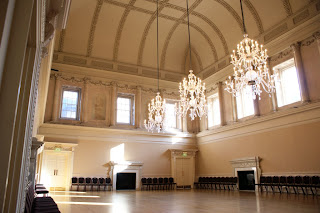 |
The entrance to the Upper Rooms, Bath (2012)
|
Dress balls and fancy balls
In Georgian times, the Bath season ran from October to early June.
The Upper Rooms held two balls a week in season, a dress ball on Monday nights and a fancy ball on Thursday nights. In 1815, subscribers were told they could expect a total of 28 balls on each subscription. However, an advert for the 1811-12 season shows the number of balls as only 24, which suggests that the number being offered varied from year to year.
Subscriptions
In 1815, a subscription to either the dress balls or the fancy balls cost 14 shillings per person. Alternatively, you could purchase a subscription to the dress balls for 26 shillings which included two tickets for ladies, which were transferable. Non-subscribers, on the other hand, were charged the sum of 5 shillings for a single ball.
The balls
According to the 1815 guide, A Guide to all the Watering and Sea-Bathing Places, the Monday dress ball consisted exclusively of country dances whilst the fancy ball included two cotillions, one before and one after tea. In the height of the season, the 1815 guide suggests that there were generally 12 sets.
 |
The ball room, the Upper Rooms, Bath (2012)
|
Mr King’s rules stated:
That the Dress and Fancy Balls shall begin as soon as possible after seven o’clock, and conclude precisely at eleven, even in the middle of a dance.1
The musical band in the rooms was to consist of twelve performers including the harp, tabor and pipe.
It seems likely that there was some variation over time as the The Assembly Rooms, Bath, the Authorised Guide gives a slightly different account. It says that the dress balls began at 6 o’clock rather than 7, and that there were only eleven musicians, who played from the first floor gallery. The ball consisted of two hours of minuets, followed by an hour of more lively country dances until tea at 9 o’clock. More country dances followed until the evening’s entertainment finished, promptly at 11 o’clock.
Refreshments
On ball nights, everyone was required to pay an extra sixpence on entrance for tea. Supper was served in the tea room.
 |
The tea room at the Upper Rooms, Bath (2012)
|
Jane Austen at the Upper Rooms
While living in Bath in May 1801, Jane Austen writes of a visit to the Upper Rooms:
By nine o’clock my uncle, aunt and I entered the rooms and linked Miss Winstone on to us. Before tea it was rather a dull affair; but then the before tea did not last long, for there was only one dance, danced by four couple. Think of four couple, surrounded by about an hundred people, dancing in the Upper Rooms at Bath! After tea we cheered up; the breaking up of private parties sent some scores more to the ball, and tho’ it was shockingly and inhumanly thin for this place, there were people enough to have made five or six very pretty Basingstoke assemblies.2
Rachel Knowles writes faith-based Regency romance and historical non-fiction. She has been sharing her research on this blog since 2011. Rachel lives in the beautiful Georgian seaside town of Weymouth, Dorset, on the south coast of England, with her husband, Andrew.
Find out more about Rachel's books and sign up for her newsletter here.
If you have enjoyed this blog and want to encourage me and help me to keep making my research freely available, please buy me a virtual cup of coffee by clicking the button below.
Notes
1. Feltham, John, A Guide to all the Watering and Sea-bathing Places for 1813 (1813).
2. Austen, Jane, My dear Cassandra, letters to her sister selected and introduced by Penelope Hughes-Hallett (Collins & Brown Ltd, 1990, London).
Sources used include:
Austen, Jane and Hughes-Hallett, Penelope, My dear Cassandra, Selected letters of Jane Austen (Collins and Brown Ltd, 1990)
Editor of the Picture of London, A Guide to all the Watering and Sea-Bathing Places (1815)
Cecil, David, A Portrait of Jane Austen (Constable, 1978)
Garnett, Oliver and Dunlop, Patricia, The Assembly Rooms, Bath, the Authorised Guide (c2011, Opalprint)
Photographs © RegencyHistory





Nice blog! Danced there once, in Regency costume with the Jane Austen Dancers. It was great fun and those country dances are harder than they look!
ReplyDeleteThat sounds wonderful! It must have been a magnificent sight having the ball room filled with dancers as it was in the time of Jane Austen.
DeleteInteresting read! I wish I could have been there, in a beautiful dress, dancing away the evening! Both then and now :-)
ReplyDeleteMe too, but I think I would need to practise my dancing first!
ReplyDeleteDeb,
ReplyDeleteI danced there last year - but there was only me in the room, pretending I wore a gorgeous gown and was waltzing with a dashing Regency rogue.
Suzi Love
Interesting post. I've visited Bath a couple of times, and loved my visit to the different sites.
ReplyDeleteThe Jane Austen Dancers will be holding a ball on 9th May 2015 at the Bath Assembly rooms. For more information please visit www.janeaustendancersbath.co.uk
ReplyDeletePlenty of time to learn how to dance before then!
DeleteThis is really interesting. DO you know what was served as 'tea' at the balls?
ReplyDeleteI confess that is a question I have never asked! If I manage to find an answer, I will post it up here. :)
DeleteDid they hold balls during Lent? I know the period wasn't kept as strictly as it had been, but few balls are recorded as being held among the fashionable before Easter in London.Or if they were held they didn't inform the newspapers.
ReplyDelete